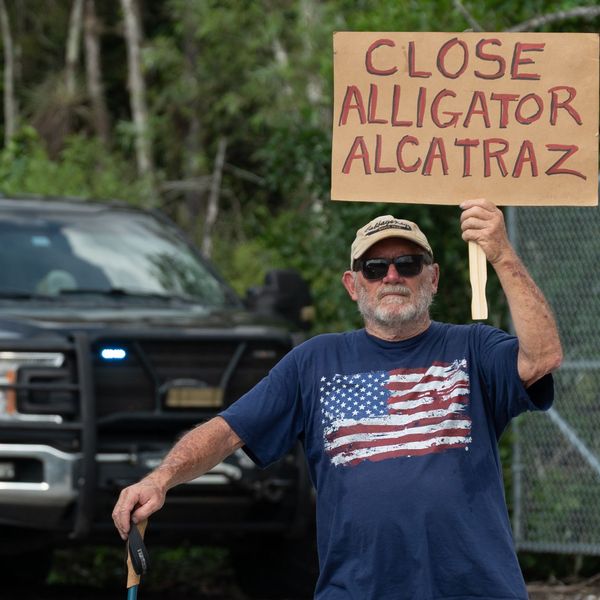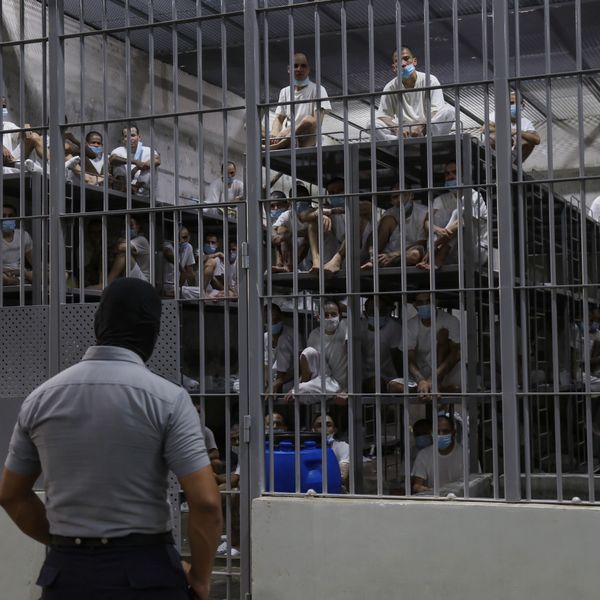Four Decades of Cruelty and Inhumanity to U.S. Political Prisoners
A Black Agenda Radio commentary
For almost 40 years, Albert Woodfox and Herman Wallace have been in solitary confinement at Louisiana's infamous Angola State Prison, in what is thought to be the longest period of enforced solitude in America's vast prison gulag. Amnesty International says their treatment is "cruel and inhumane and a violation of the US's obligations under international law." Woodfox is now 64 years old, and Wallace is 69. They are two of the original Angola 3, convicted of the murder of a prison guard in 1972. The other member of the trio, Robert King, was released after 29 years in solitary confinement after pleading guilty to a lesser charge.
Under the conditions of solitary confinement, Woodfox and Wallace are restricted to their tiny cells for 23 hours a day. Three times a week, for an hour, they are allowed to exercise in an outdoor cage, if weather permits. For 40 years, they have not been allowed access to work or to education. And there has been no legitimate review of their cases in all that time.
There was never any physical evidence of the men's guilt, only the very questionable testimony of other inmates, one of whom was bribed by officials and another of whom retracted his testimony. Woodfox and Wallace and King have been subjected to the greatest cruelties Louisiana has to offer because they became political prisoners after entering Angola, when they formed a prison chapter of the Black Panther Party. One prison official says flatly, that "there's been no rehabilitation" from "practicing Black Pantherism." In other words, the prison considers their politics to be their crime.
Albert Woodfox's conviction has twice been overturned by lower courts on the basis of racial discrimination, prosecutorial misconduct, inadequate defense and suppression of evidence. But the U.S. Court of Appeals decided that Woodfox's fate was Louisiana's business. Amnesty International demands only that the two elderly prisoners be released from solitary. Woodfox and Wallace, it should be pointed out, became political prisoners after initially being incarcerated for criminal offenses.
There are scores of U.S. political prisoners that have languished behind bars for three or four decades. The National Conference of Black Lawyers has been pressing for their outright release, especially those who were wrongfully imprisoned due to the FBI's COINTELPRO operation, which sought to "neutralize" and destroy radical political activists and organizations - most notably the Black Panther Party. In the cases of those targeted by COINTELPRO, it was the federal government's lawlessness that led to a lifetime in prison. Therefore, the U.S. government is obligated to free them. But the United States continues to deny that there is such a thing as a political prisoner within its borders. The Obama administration is always eager to claim that other countries are abusing their political prisoners. It also says it wants to play an active role in the Human Rights Council of the United Nations. But that will require the U.S. to answer charges that it imprisons people for political reasons, holds them under cruel and inhuman conditions, and that racism pervades its criminal justice system.
An Urgent Message From Our Co-Founder
Dear Common Dreams reader, The U.S. is on a fast track to authoritarianism like nothing I've ever seen. Meanwhile, corporate news outlets are utterly capitulating to Trump, twisting their coverage to avoid drawing his ire while lining up to stuff cash in his pockets. That's why I believe that Common Dreams is doing the best and most consequential reporting that we've ever done. Our small but mighty team is a progressive reporting powerhouse, covering the news every day that the corporate media never will. Our mission has always been simple: To inform. To inspire. And to ignite change for the common good. Now here's the key piece that I want all our readers to understand: None of this would be possible without your financial support. That's not just some fundraising cliche. It's the absolute and literal truth. We don't accept corporate advertising and never will. We don't have a paywall because we don't think people should be blocked from critical news based on their ability to pay. Everything we do is funded by the donations of readers like you. Will you donate now to help power the nonprofit, independent reporting of Common Dreams? Thank you for being a vital member of our community. Together, we can keep independent journalism alive when it’s needed most. - Craig Brown, Co-founder |
For almost 40 years, Albert Woodfox and Herman Wallace have been in solitary confinement at Louisiana's infamous Angola State Prison, in what is thought to be the longest period of enforced solitude in America's vast prison gulag. Amnesty International says their treatment is "cruel and inhumane and a violation of the US's obligations under international law." Woodfox is now 64 years old, and Wallace is 69. They are two of the original Angola 3, convicted of the murder of a prison guard in 1972. The other member of the trio, Robert King, was released after 29 years in solitary confinement after pleading guilty to a lesser charge.
Under the conditions of solitary confinement, Woodfox and Wallace are restricted to their tiny cells for 23 hours a day. Three times a week, for an hour, they are allowed to exercise in an outdoor cage, if weather permits. For 40 years, they have not been allowed access to work or to education. And there has been no legitimate review of their cases in all that time.
There was never any physical evidence of the men's guilt, only the very questionable testimony of other inmates, one of whom was bribed by officials and another of whom retracted his testimony. Woodfox and Wallace and King have been subjected to the greatest cruelties Louisiana has to offer because they became political prisoners after entering Angola, when they formed a prison chapter of the Black Panther Party. One prison official says flatly, that "there's been no rehabilitation" from "practicing Black Pantherism." In other words, the prison considers their politics to be their crime.
Albert Woodfox's conviction has twice been overturned by lower courts on the basis of racial discrimination, prosecutorial misconduct, inadequate defense and suppression of evidence. But the U.S. Court of Appeals decided that Woodfox's fate was Louisiana's business. Amnesty International demands only that the two elderly prisoners be released from solitary. Woodfox and Wallace, it should be pointed out, became political prisoners after initially being incarcerated for criminal offenses.
There are scores of U.S. political prisoners that have languished behind bars for three or four decades. The National Conference of Black Lawyers has been pressing for their outright release, especially those who were wrongfully imprisoned due to the FBI's COINTELPRO operation, which sought to "neutralize" and destroy radical political activists and organizations - most notably the Black Panther Party. In the cases of those targeted by COINTELPRO, it was the federal government's lawlessness that led to a lifetime in prison. Therefore, the U.S. government is obligated to free them. But the United States continues to deny that there is such a thing as a political prisoner within its borders. The Obama administration is always eager to claim that other countries are abusing their political prisoners. It also says it wants to play an active role in the Human Rights Council of the United Nations. But that will require the U.S. to answer charges that it imprisons people for political reasons, holds them under cruel and inhuman conditions, and that racism pervades its criminal justice system.
For almost 40 years, Albert Woodfox and Herman Wallace have been in solitary confinement at Louisiana's infamous Angola State Prison, in what is thought to be the longest period of enforced solitude in America's vast prison gulag. Amnesty International says their treatment is "cruel and inhumane and a violation of the US's obligations under international law." Woodfox is now 64 years old, and Wallace is 69. They are two of the original Angola 3, convicted of the murder of a prison guard in 1972. The other member of the trio, Robert King, was released after 29 years in solitary confinement after pleading guilty to a lesser charge.
Under the conditions of solitary confinement, Woodfox and Wallace are restricted to their tiny cells for 23 hours a day. Three times a week, for an hour, they are allowed to exercise in an outdoor cage, if weather permits. For 40 years, they have not been allowed access to work or to education. And there has been no legitimate review of their cases in all that time.
There was never any physical evidence of the men's guilt, only the very questionable testimony of other inmates, one of whom was bribed by officials and another of whom retracted his testimony. Woodfox and Wallace and King have been subjected to the greatest cruelties Louisiana has to offer because they became political prisoners after entering Angola, when they formed a prison chapter of the Black Panther Party. One prison official says flatly, that "there's been no rehabilitation" from "practicing Black Pantherism." In other words, the prison considers their politics to be their crime.
Albert Woodfox's conviction has twice been overturned by lower courts on the basis of racial discrimination, prosecutorial misconduct, inadequate defense and suppression of evidence. But the U.S. Court of Appeals decided that Woodfox's fate was Louisiana's business. Amnesty International demands only that the two elderly prisoners be released from solitary. Woodfox and Wallace, it should be pointed out, became political prisoners after initially being incarcerated for criminal offenses.
There are scores of U.S. political prisoners that have languished behind bars for three or four decades. The National Conference of Black Lawyers has been pressing for their outright release, especially those who were wrongfully imprisoned due to the FBI's COINTELPRO operation, which sought to "neutralize" and destroy radical political activists and organizations - most notably the Black Panther Party. In the cases of those targeted by COINTELPRO, it was the federal government's lawlessness that led to a lifetime in prison. Therefore, the U.S. government is obligated to free them. But the United States continues to deny that there is such a thing as a political prisoner within its borders. The Obama administration is always eager to claim that other countries are abusing their political prisoners. It also says it wants to play an active role in the Human Rights Council of the United Nations. But that will require the U.S. to answer charges that it imprisons people for political reasons, holds them under cruel and inhuman conditions, and that racism pervades its criminal justice system.

